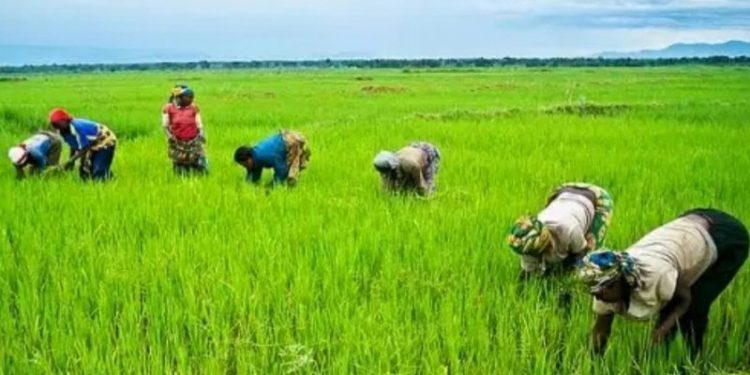Rice Farmers in the Akatsi South District in the Volta Region have appealed to government, institutions, and NGOs for support as a result of increase in farm inputs which may affect their production this year as the farming season is about to begin.
The Chairman of the Ghana Rice Inter-Professional Body (GRIB) in the Akatsi South Municipal, Mr. Richard Odzor told The New Publisher, that most rice farmers have not been able to buy the needed amount of inputs for farming because prices of these inputs are “above their strength”.
This, he said, has resulted in most rice farmers cultivating on a very small scale in the district.
“Majority of the farmers, instead of cultivating on a 10-acre land, have only tilled 3 acres because of the high cost of ploughing and farm inputs such as fertilizer. We spend GHS 200.00 to plough an acre of land before harrowing. Harrowing is done in two stages before planting can begin and the cost of harrowing an acre is GHS 150.00. This poses a serious financial burden on us” he said.
Rice consumption in Ghana
Statistics from the Ministry of Food and Agriculture show that Ghana’s rice consumption is at 1.3million metric tonnes annually. Yet the country produces about 721,610 metric tonnes a year with a deficit of 580,000 metric tonnes imported.
However, Ghana Rice Inter-Professional Body’s (GRIB’s) survey shows that the Volta Region alone can produce 1.4 million metric tonnes annually.
It can be recalled that the Region suffered a great drought in June 2020, leading to huge losses for farmers. Due to these lurking challenges of unreliable rainfall patterns, increase in prices of inputs, and ploughing services, the Region has not been able to match up to this deficit in rice production.
Mr. Odzor said due to the drought last year, a lot of the farmers could not pay the input dealers on time hence, these input dealers are not willing to give their inputs on credit this year.
All these have made a lot of farmers limit their land sizes for production this year, according to Mr. Odzor.
The Chairman of GRIB in the in the Akatsi South Municipal sounded an alarm that if nothing is done to curb the situation, it may lead to a major decline in rice production in the Volta Region this year.
He further lamented that “Volta Region has been reported to be the leading rice producer in Ghana hence this major decline might cause the region to lose its place in rice production which will intend reduce the annual production of rice in Ghana”.
Mr. Odzor iterated that rice farmers in the District will be glad to have input dealers come to their aid before the rains begin. He said, apart from the high cost of inputs, the District also lacks a warehouse, a drying floor, and a market to sell paddy rice.
Commenting on the prices of paddy rice, Mr. Odzor said “Inputs prices, as well as land preparation costs, are higher but the prices of paddy rice keep fluctuating”.
The need for collaboration
Increased partnership between the government, farmers, and private sectors is a driver of innovation and economic growth. Strong partnerships help to cut costs, improve products, and open new markets.
With strong collaboration between rice farmers in the Akatsi North District and other private and government bodies, dams or dugouts can be built for these rice farmers to reduce their over reliance on rain-fed agriculture.
Partnerships would also promote mechanization to aid in land preparation, paddy rice harvesting and milling. It will also ensure prompt supply of fertilizers and agrochemicals to farmers to improve yields.
With these Agri-PPPs, rice farmers in the district will be efficient in rice production to feed the domestic market and also export to neighboring countries.


Comments are closed.